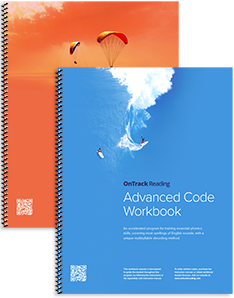Early Client Results
OnTrack Reading Phonics Program
Teach your student the phonics advanced code in as little as 8 weeks with our 170-page workbook and instruction manual.
During the summer of 1998 I managed to acquire a few paying clients in my new reading business based primarily on recommendations of the mother of the three brothers I had taught earlier.
In subjective terms, what I observed about nearly all of the children I worked with that summer is that their confidence grew, as did their reading performance. However, guided by Diane McGuinness’s comment that reading instructors are somewhat notorious for avoiding objective testing, I did do pre-testing and post-testing of their reading levels.
What I found was not particularly encouraging. Even though the children clearly were more comfortable decoding words and had much better underlying phonics skills, their reading ability did not advance more than a few months when they were retested. And remember, I was working with them for a few months, so they should have advanced that much just to stay even.
The real story of those early clients only became clear a year later. Two different parents decided to have me work again with their children. In both cases, their measured reading level had jumped a full two years since the last time I’d seen them! This was similar to the experience with each of the three brothers, all of whom finally started to make normal gains in reading ability after completing instruction (even though they still lagged compared to peers.)
And remember, all of these were children who in the past had lagged significantly in reading ability, making at best a half-year’s gain over each complete school year. The message here is that it is possible for a parent without formal training to make a significant difference in a child’s reading ability by using an effective phonics program.
In addition, both children who returned later retained the training they had received in the following crucial phonics skills: blending, segmenting, and phoneme manipulation. They also retained most of the code knowledge they had learned the year earlier.
Over the past several years I have concluded that there are two primary causes of poor reading, or dyslexia, if you prefer. The first cause is not dyslexia at all, but is instead the result of using reading curricula that are insufficient for teaching the necessary skills, imparting the necessary code knowledge and, above all, convincing children that English spellings are based on the individual sounds in words. This topic, phonics, is thoroughly discussed in The OnTrack Reading Phonics Program.
The second cause of poor reading is dyslexia, as I have come to interpret the term. Next I’ll briefly describe the training I underwent, to be followed by an unexpected turn in my journey of helping children overcome their reading problems and how that turn eventually shaped my views on dyslexia.


